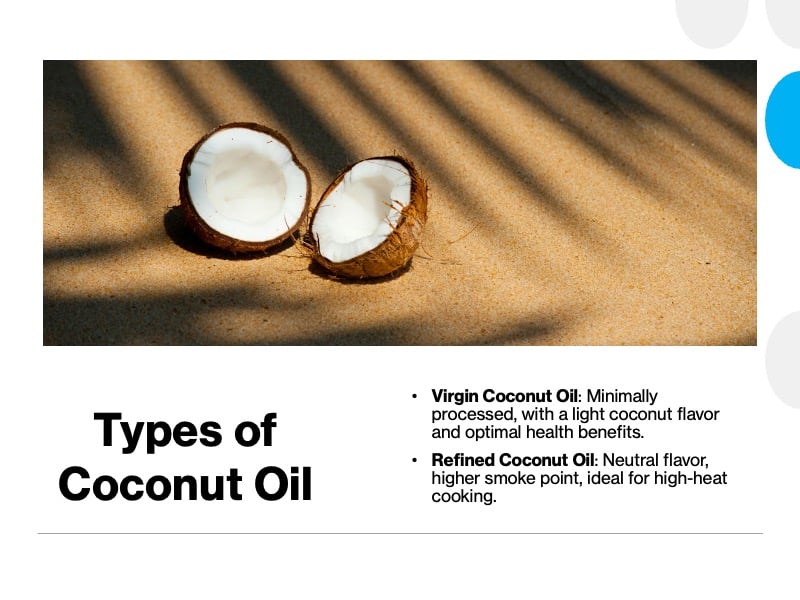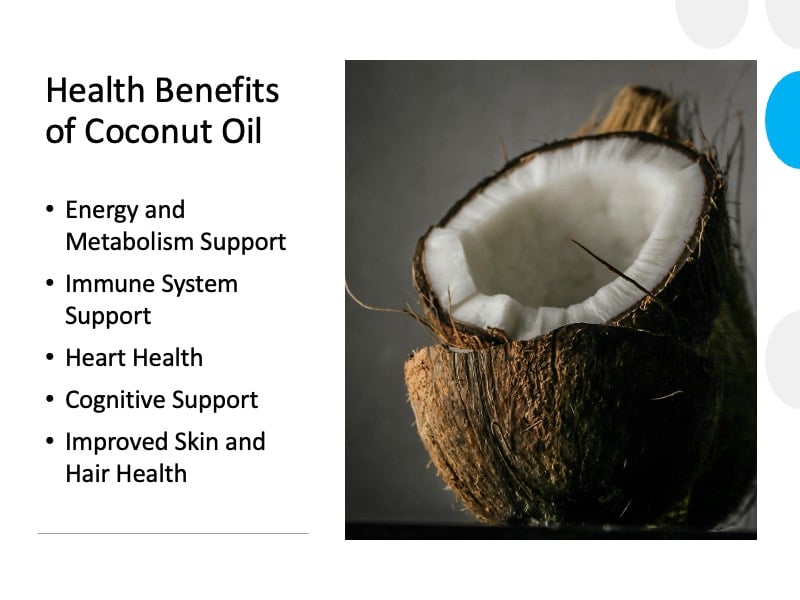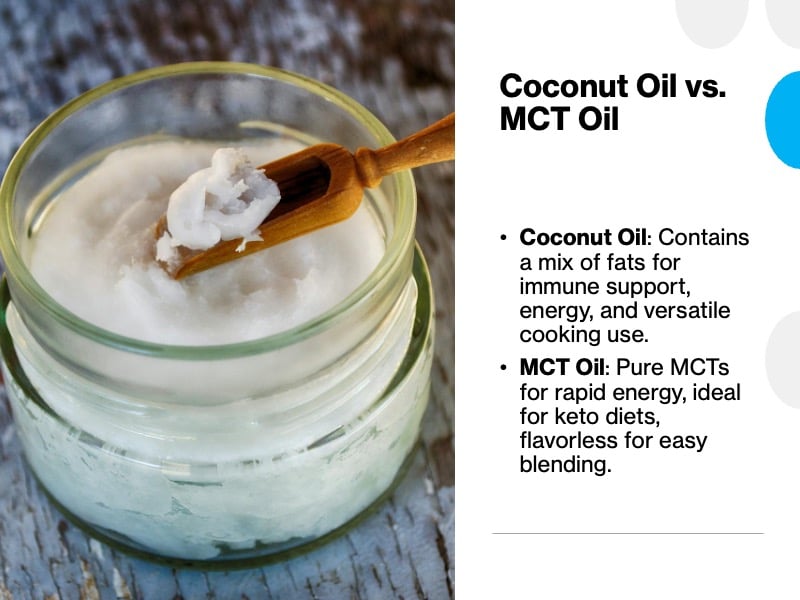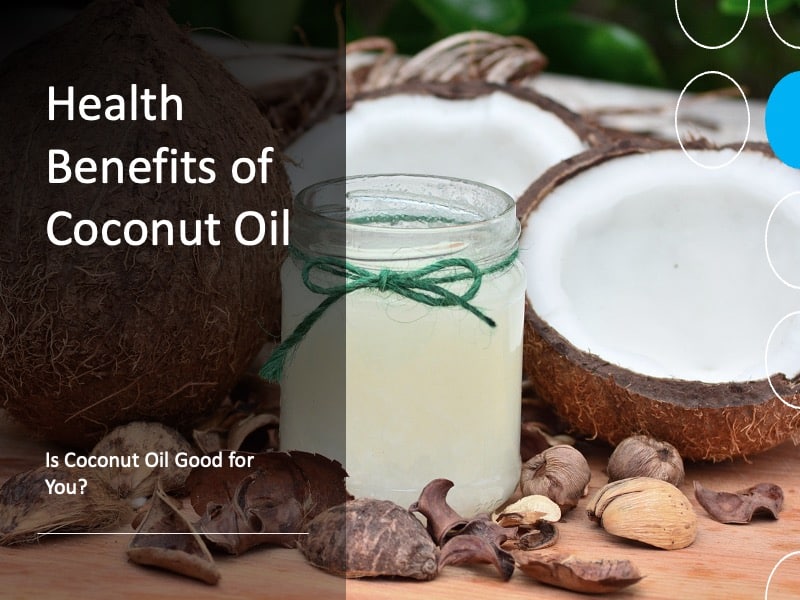Health Benefits of Coconut Oil: Is Coconut Oil Good for You?
Derived from the meat of mature coconuts, coconut oil contains medium-chain triglycerides (MCTs) that provide a range of health benefits, from heart health support to potential cognitive improvements.
Research on coconut oil suggests it can be a valuable addition to many diets, supporting energy levels, gut health, and even skin vitality.
However, the health benefits of coconut oil depend on quality, usage, and individual needs, making it essential to know how and when to incorporate it into your diet.
What is Coconut Oil?
Coconut oil is a natural oil extracted from the meat (or kernel) of mature coconuts, typically harvested from the coconut palm tree (Cocos nucifera). Known for its high saturated fat content, coconut oil is solid at room temperature but becomes liquid when warmed, giving it a versatile range of culinary and cosmetic uses.
The majority of its fat content comes from medium-chain triglycerides (MCTs), which are shorter chains of fatty acids that the body metabolizes differently from other fats.
This unique composition allows coconut oil to be quickly converted into energy rather than being stored as fat, contributing to its popularity in various diets.
Additionally, coconut oil is rich in lauric acid, a fatty acid with antimicrobial and anti-inflammatory properties, which offers added health benefits.

There are two main types of coconut oil:
- Virgin (or unrefined) coconut oil: Extracted from fresh coconut meat, it retains a light coconut flavor and aroma. It undergoes minimal processing and is commonly considered the best option for health benefits.
- Refined coconut oil: Made from dried coconut meat (copra) and processed to remove impurities, this type has a neutral flavor and higher smoke point, making it suitable for high-heat cooking.
Overall, coconut oil’s unique composition and stability make it a favored choice for cooking, health remedies, and skincare.
Health Benefits of Coconut Oil

Coconut oil has become a popular choice in health and wellness circles, offering various potential benefits beyond its culinary uses.
Packed with medium-chain triglycerides (MCTs) and lauric acid, coconut oil has a unique profile that supports heart health, boosts metabolism, and even offers antimicrobial properties.
Its versatility allows it to be used in everything from cooking to skin care routines, making it a staple for those looking to incorporate natural and functional ingredients into their lifestyle.
Understanding the health benefits of coconut oil reveals why it has gained such a loyal following and how it can be a valuable addition to a balanced diet and wellness regimen.
Energy and Metabolism Support
Coconut oil is high in MCTs, primarily lauric acid, which the body can metabolize quickly for an energy boost. Unlike long-chain fatty acids in most fats, MCTs are absorbed rapidly, which may improve endurance and stamina in athletes or physically active individuals (Dunn et al., 2023).
MCTs also contribute to thermogenesis, a process that increases metabolism, making it one of the best natural fat burners.
Immune System Support
Lauric acid, one of the main components of coconut oil, has shown antibacterial, antifungal, and antiviral properties. It can help combat pathogens like bacteria and viruses, offering natural immune system support (Jadhav & Annapure., 2022).
This benefit makes coconut oil especially appealing during cold and flu seasons.
Heart Health
Coconut oil has a mix of saturated and unsaturated fats, which initially raised concerns for heart health. However, research has highlighted its potential benefits in raising HDL (good cholesterol) levels while maintaining LDL levels when consumed in moderation (Eyres et al., 2016).
By increasing HDL, coconut oil can support a healthier lipid profile, which may reduce cardiovascular risk.
Cognitive Support
Recent studies have explored coconut oil’s potential benefits for brain health, particularly in aging populations.
MCTs can be quickly converted into ketones, an alternative fuel source for the brain, which may support cognitive function and potentially benefit people with neurodegenerative conditions like Alzheimer’s disease (Sun et al., 2023).
Improved Skin and Hair Health
Coconut oil’s moisturizing and antimicrobial properties make it beneficial for skin and hair care.
Topically, it can help alleviate dry skin, reduce eczema symptoms, and protect against hair damage (Verallo-Rowell et al., 2008). Its natural antioxidant properties also protect against free radical damage, promoting a youthful appearance.
Try making your own homemade facial mask with coconut oil and other natural ingredients.
Coconut Oil for Different Ages and Populations
Coconut oil offers a unique range of health benefits supporting various needs across different ages and populations.
From children and adults to older individuals and athletes, each group can benefit from coconut oil’s energy-boosting MCTs, immune-supporting lauric acid, and rich nutritional profile.
However, the way coconut oil supports health can vary depending on age, lifestyle, and individual health goals.
Whether it’s aiding cognitive function in older adults or providing a quick energy source for athletes, understanding how to use coconut oil effectively for each population is essential for maximizing its benefits.
Adults
For adults, coconut oil can be a healthy addition to the diet when used in moderation. It supports metabolism, boosts energy, and may improve skin and hair health. Adults can add it to their diet in multiple ways, including in coffee, smoothies, and as a cooking oil.
Older Adults
In older adults, the cognitive support from coconut oil’s MCTs is a key benefit, as it may provide an alternative energy source for the brain.
Additionally, coconut oil can help alleviate dry skin, which is common with aging, and may improve digestive health due to its antimicrobial properties.
However, due to its high caloric density, it should be used sparingly.
Children
Coconut oil is safe for children in small amounts and can be a helpful addition to increasing healthy fat intake. It can be added to oatmeal or smoothies to support their energy levels and digestion.
As with adults, moderation is key, as coconut oil is calorie-dense and may not be necessary in high amounts for young, active metabolisms.
Athletes
Athletes may find coconut oil particularly beneficial as a quick, sustainable energy source.
The MCTs in coconut oil provide rapid energy and can support endurance. Mixing it into pre-workout meals like oatmeal or smoothies can give a boost to stamina and reduce post-exercise fatigue.
Recommended Dosages and Timing
For most adults, 1–2 tablespoons per day is a reasonable amount to experience coconut oil’s health benefits without consuming excessive calories.
Beginners may start with 1 teaspoon per day to let their body adjust, gradually increasing the intake if no adverse effects are experienced.
To maximize energy benefits, consider consuming coconut oil in the morning, adding it to coffee or breakfast, or using it pre-workout to boost endurance.
Excessive consumption can lead to digestive discomfort, so it’s best to stick within recommended limits and integrate coconut oil as part of a balanced diet.
How to Add Coconut Oil to Your Diet

Integrating coconut oil into your diet can be simple and enjoyable, especially when using it in various recipes. Here are some easy ways to add it to your meals:
Coconut Oil in PB & J Sandwiches
Adding a small amount of coconut oil to peanut butter can enhance the flavor and give a smooth texture, adding healthy fats to a classic PB & J sandwich.
Coconut Oil in Oatmeal
Adding a teaspoon of coconut oil to oatmeal enhances the creaminess and provides a dose of healthy fats.
The tropical flavor complements fruits like bananas, berries, and shredded coconut, making it a flavorful breakfast.
Bulletproof Coffee
Bulletproof coffee, a popular choice for those on ketogenic or low-carb diets, combines coffee with coconut oil and sometimes butter for a frothy, energy-boosting drink. The MCTs in coconut oil provide a quick source of energy and may reduce coffee-related jitters.
Baking and Cooking
Coconut oil can substitute other fats in baking recipes, adding a unique flavor to baked goods like muffins, cookies, or banana bread.
It’s also a great option for stir-frying vegetables or cooking eggs, as it has a high smoke point and adds a subtle, nutty taste.
Smoothies
Adding coconut oil to smoothies increases the healthy fat content, supporting energy and enhancing the creaminess of the drink.
It pairs well with tropical fruits like pineapple and mango.
Coconut Oil vs. MCT Oil: Is Coconut Oil or MCT Oil Healthier?
Coconut Oil contains a mix of medium- and long-chain fatty acids, primarily lauric acid, which offers antimicrobial and immune-boosting benefits. It’s versatile in cooking and skincare, providing energy, promoting heart health, and supporting skin vitality.
MCT Oil, however, is a concentrated oil that isolates pure medium-chain triglycerides (usually caprylic and capric acids) found in coconut oil. MCTs are rapidly absorbed and converted into energy, making MCT oil ideal for quick, sustained energy, especially in low-carb or ketogenic diets.
Unlike coconut oil, MCT oil is flavorless and often used as a supplement in smoothies, coffee, or taken alone for an immediate energy boost.
In short, while both oils support energy and metabolism, MCT oil provides quicker energy absorption, whereas coconut oil offers broader health and culinary benefits due to its varied fatty acid content.



